2022 Loren E. Wold Research Award Recipients
Douglas Alvarado, Erika Broeker, Evelyn Harper, and Judy Wong are the recipients of the Loren E. Wold Research Award for 2022
The Loren E. Wold Research Awards have been established by Biology alumnus Dr. Loren E. Wold (CAS ’97), a distinguished research scientist and Professor at Ohio State University. Dr. Wold is a strong advocate of undergraduate research and mentoring and this award supports summer research projects in the amount of $5,700 for salary and a $200 Conference Travel Award. Recipients are chosen based on outstanding UROP applications. This year's recipients are:
Douglas Alvarado, a Biochemistry and Molecular Biology major, conducting research with Dr. Peter Buston on a project titled “An Investigation of Genetic Mechanisms Underlying Strategic Growth in the Clown Anemonefish Amphiprion Percula.”
Erika Broeker, a Biology major, conducting research with Dr. Francisco Naya on a project titled “Determining the role of the lncRNA Meg3 in Cell Lineage Determination.”
Evelyn Harper, a Biology major, conducting research with Dr. Angela Ho on a project titled “Neurodevelopmental effects of inhibiting the Aldolase A – Actin interaction.”
Judy Wong, a Biochemistry and Molecular Biology major, conducting research with Dr. Thomas Gilmore on a project titled “Effect of Human Disease Mutations in a Central Region of the Scaffold Protein-NEMO on Cellular Activity.”
Congratulations to this year's recipients for their hard work and dedication to undergraduate research. Thank you to Dr. Wold for his support of undergraduate students and their research.
Meg Younger Publishes Study in Cell
A new study published in Thursday's edition of Cell reports that a mosquito's sense of smell is more complicated than we once thought.
Neuroscientist and faculty member Meg Younger along with colleagues Leslie Vosshall of the Howard Hughes Medical Institute and Rockefeller University, Margo Herre of Rockefeller University, and Olivia Goldman of Rockefeller University peered into the mosquito's brain to decipher how it smells its surroundings.
Pete Buston and Tim Clutton-Brock Publish a Review in Trends in Ecology and Evolution Journal
Congratulations to Pete and Tim on this publication!
Meg Younger named 2022 Searle Scholar
Dr. Meg Younger has been named a 2022 Searle Scholar. Younger is one of 15 young faculty members in the biomedical sciences and chemistry who have recently been appointed as one of the assistant professors on tenure-track appointments. The cohort was selected from a group of 191 applicants from 137 universities and research institutions. Each Scholar receives an award of $300,000 in flexible funding to support their research over the next three years. Dr. Younger's lab focuses on olfaction in mosquitos, examining how they detect and encode human odor.
Maria Jose Salazar Nicholls Receives 2022 Thomas H. Kunz Award
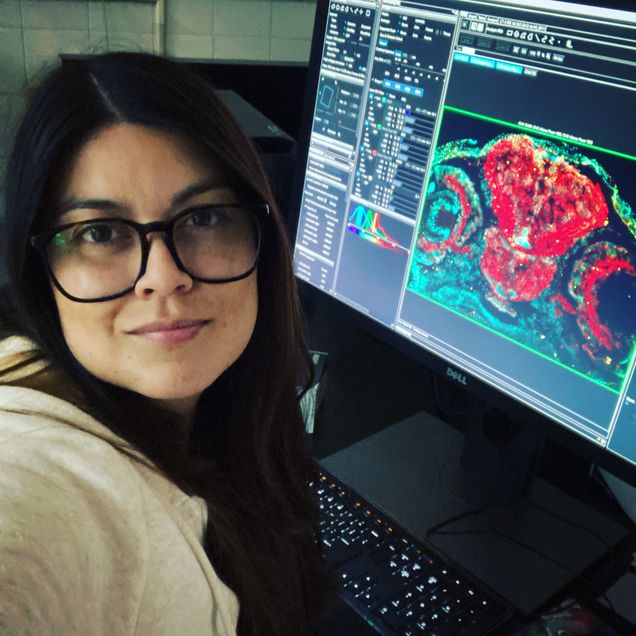
Maria Jose Salazar Nicholls of the Warkentin Lab is this year’s recipient of the Thomas H. Kunz Award. Her thesis work focuses on the mechanisms enabling adaptive embryo behavior in red-eyed treefrogs, Agalychnis callidryas. Maria completed her BS at Pontifical Catholic University in Ecuador, where she worked in the Developmental Biology lab studying the early development of Ecuadorian frogs’ embryos. She is interested in phenotypic plasticity, embryo behavior, development, and mechanisms underlying plasticity.
This award provides support for Ecology, Behavior & Evolution (EBE) PhD candidates who have completed the qualifying exam, with a preference for those conducting field research in the award year. The award was established in 2015 in recognition and appreciation of Professor Thomas H. Kunz’s mentorship. His current and former graduate students established this award to serve as a lasting legacy of Tom’s contributions at BU and beyond. Learn more about Dr. Kunz and how you can support this award.
Congratulations, Maria!
Daniel Wuitchik Receives Dana Wright Fellowship
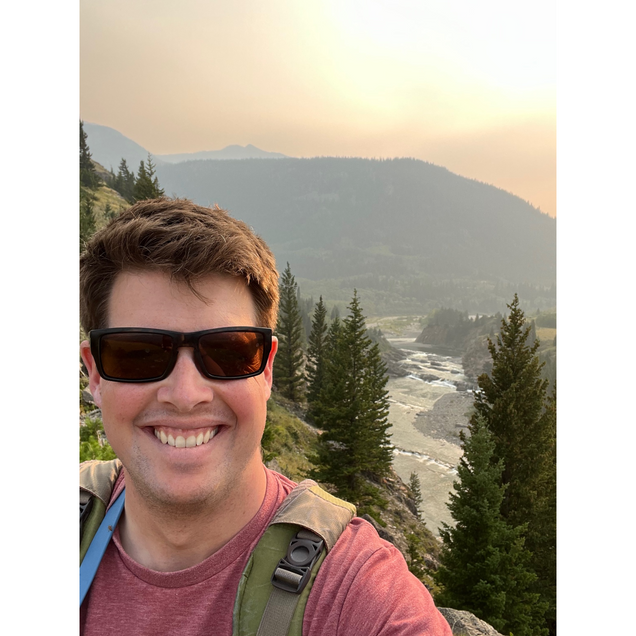
Daniel Wuitchik of the Davies Lab is the 2022 recipient of the Dana Wright Fellowship.
Daniel's research explores the effects of temperature on stress, symbiosis, and patterns of diversity in marine invertebrates. He leverages modern genomic tools, coupled with phenotypic assays of thermal performance to better understand how these invertebrates respond to increasing temperatures. His focus is on species that are local to New England, and attempts to contextualize how they may be impacted under anthropogenic climate change.
This fellowship was established in memory of Dana Wright (CAS ’00), an alum of the BU Marine Program. After completing her studies, Wright went on to work in research in right whale acoustics at the Woods Hole Oceanographic Institution on Cape Cod.
Congratulations, Daniel!
Sarah Speroff Receives 2022 Denton Award
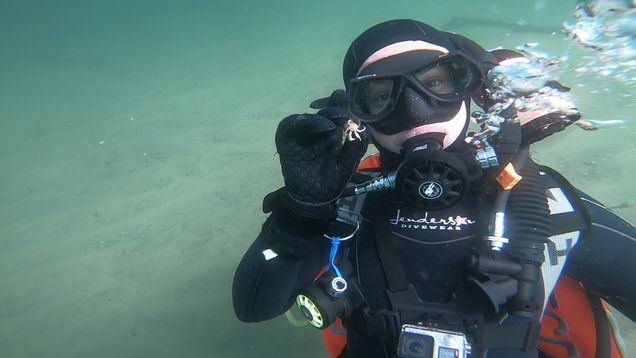
Sarah Speroff of the Rotjan Lab was selected as the winner of the 2022 Denton Award for their master’s research thesis in biology titled “Stressed out in a Changed World: Investigating the Strength of the Temperate Coral Response to Acute and Chronic Anthropogenic Stress.” This award is given for excellence in scholarship and research accomplishment during a master’s thesis in the Department of Biology.
Sarah received their BA from Kenyon College where they studied Biology and Environmental Science. Prior to BU, they interned with the New England Aquarium's Marine Mammal Education and Research team and sailed aboard the SSV Corwith Cramer as a student with the Sea Education Association. Sarah's master's research focused on the synergistic impacts of climate change stress on the partnership between urban corals and their algal symbionts.
Congratulations, Sarah!
2022 Biology Graduate Teaching Awards
The Biology Graduate Committee is delighted to announce the winners of the Department’s graduate teaching awards:
E Schlatter as the winner of the 2021-2022 Outstanding Teaching Fellow in Biology award for teaching excellence over the past year. E served the Department as a teaching fellow in for Genetics (BI 206), for which E has been praised their ability to guide students in dissecting and analyzing problems in course content. E's evaluations from students noted their strengths in explaining concepts, their responsiveness to students’ needs, and their willingness to spend extra time with students, to ensure that they understood concepts from class. In this way, E has gone above and beyond typical expectations for a TF in Biology.
Isabella Muratore as the winner of the Biology Distinguished Teaching Fellow Award for teaching excellence throughout her graduate career. Isabella has served the Department for the multiple years as a teaching fellow, including for an unusually broad range of courses encompassing nonmajors (Sociobiology, BI 119), premedical Biology concentrators (Introductory Biology, BI 107, BI 108), and courses for the Specialization in Behavioral Biology (BI 225). Isabella has been noted by both students and faculty over the years for her ability to connect and engage a diversity of students with STEM and non-STEM backgrounds, her ability to provide clear explanations, her ability to encourage dynamic, interactive classes in both discussion sections and in laboratory courses. In addition to TFing, Isabella mentored many undergraduate students in her research, including students with disabilities, who have gone on to graduate programs in Biology
Each year in Biology, there are many worthy nominees for these teaching awards. The Graduate Committee is continually impressed the the quality of teaching and mentorship among our graduate students. The Committee would like to thank all of those who have contributed to Biology’s teaching mission over the past year and throughout their graduate career here at BU.
Congratulations, E and Isabella!
Karina Scavo Lord and Leah Williams Receive 2022 Belamarich Award
This year, the Department of Biology is excited to announce that we have selected two winners for the 2022 Belamarich Award. This award is given annually to a recent PhD candidate for their outstanding doctoral dissertation completed in the Department of Biology.
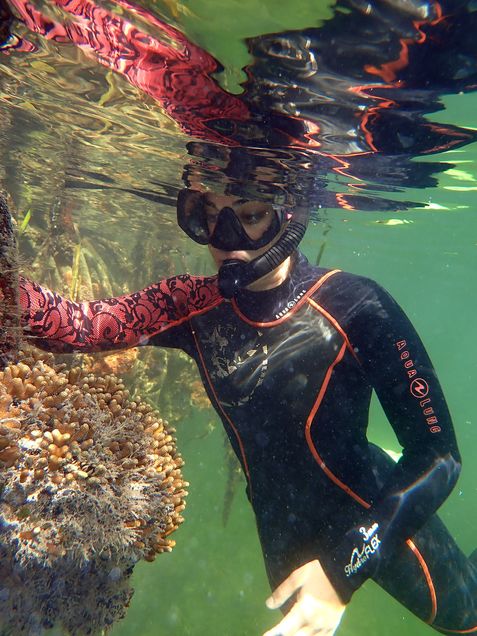 Dr. Karina Scavo Lord of the Finnerty Lab was selected for her doctoral dissertation in Biology titled “The Importance of Mangroves as Coral Habitat in a Deteriorating Ocean – An Ecological, Demographic, and Genomic Research Program on Model Mangrove Corals in the Genus Porites.” The committee was impressed by Karina's extensive research productivity, the originality of her work, her research independence throughout her PhD, and the impact of her research on population ecology, marine biology, and conservation science. The committee also admired Karina's mentoring record and the outreach activities she engaged in during her graduate career here at BU. More information about her research is below. Dr. Karina Scavo Lord of the Finnerty Lab was selected for her doctoral dissertation in Biology titled “The Importance of Mangroves as Coral Habitat in a Deteriorating Ocean – An Ecological, Demographic, and Genomic Research Program on Model Mangrove Corals in the Genus Porites.” The committee was impressed by Karina's extensive research productivity, the originality of her work, her research independence throughout her PhD, and the impact of her research on population ecology, marine biology, and conservation science. The committee also admired Karina's mentoring record and the outreach activities she engaged in during her graduate career here at BU. More information about her research is below.
Mangroves are widely regarded as unsuitable habitats for corals, and for this reason, very few studies have characterized coral populations in mangroves. However, as coral reefs decline rapidly, an emerging thread of research suggests that mangroves may be critical to the survival and evolution of corals, as well as the resilience of coral reefs. Karina’s dissertation research has endeavored to fill this critical gap in our knowledge and build a research program to investigate the role of mangrove habitats as important habitat for coral survival and evolution. Using model mangrove corals in the genus Porites, she combined longitudinal field work, population modeling, and genomics to study their survival, growth, and reproduction, as well as how key coral traits vary between reef and mangrove habitats. This research builds on the growing recognition that mangroves, as well as other reef-associated habitats, may prove critical to the survival of reef corals and the resilience of coral reefs. Karina will be continuing this research on mangrove corals in her NSF postdoctoral fellowship at the University of Texas at Austin, where she is studying the mechanisms by which a predominately clonal (genetically poor) mangrove coral population can display phenotypic variation and respond to changing environmental conditions. |
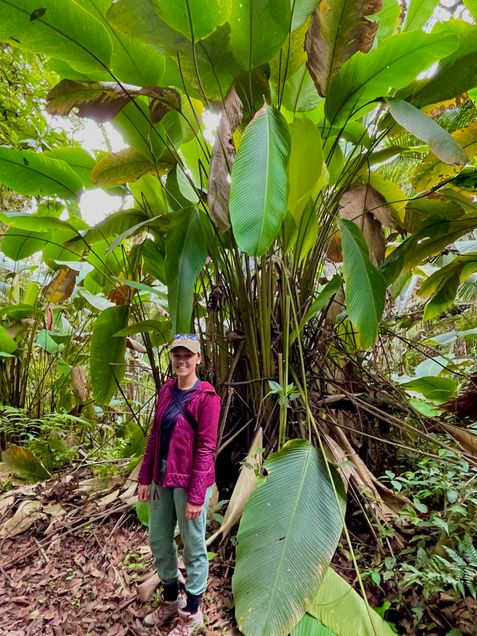 Dr. Leah Williams of the Gilmore Lab was selected for her doctoral dissertation in Biology titled “Structure, Activity, and Biology of Transcription factor NF-κB in Evolutionary Basal Organisms: Insights into the Origins of Immune Regulation.” The committee was impressed by Leah's immense research productivity (as evidenced through her publication record), the technical complexity of her work, and the impact of her work across the fields of molecular, evolutionary, and environmental biology. The committee also admired Leah's leadership, teaching, and mentoring record, as well as her outstanding level of service to the department. More information about her research is below. Dr. Leah Williams of the Gilmore Lab was selected for her doctoral dissertation in Biology titled “Structure, Activity, and Biology of Transcription factor NF-κB in Evolutionary Basal Organisms: Insights into the Origins of Immune Regulation.” The committee was impressed by Leah's immense research productivity (as evidenced through her publication record), the technical complexity of her work, and the impact of her work across the fields of molecular, evolutionary, and environmental biology. The committee also admired Leah's leadership, teaching, and mentoring record, as well as her outstanding level of service to the department. More information about her research is below.
Despite the approximately 100,000 publications on the immune-related transcription factor NF-κB, very little data exists on this important transcription factor in organisms other than mammals and flies. In her dissertation, Leah examined the structure, activity, and biology of the transcription factor NF-κB in three basal phyla to explore the extent of conservation with more derived organisms as well as phylum-specific properties. These data suggest that the mechanism as well as level of activation of NF-κB in basal organisms is different from what is observed in higher organisms. Overall, these data represent the first functional characterization of NF-κB signaling proteins in an endangered coral, in any organisms basal to cnidarians (i.e., an evolutionary important sponge), and any organism outside the Kingdom Animalia (protists). These findings suggest that these seemingly simple organisms contain conserved innate immune-like pathways that may be regulated by NF-κB and provide information about the evolution, ecology, and diversification of this biologically important transcription factor. Leah is currently a Scientist at CRISPR Therapeutics in Cambridge, MA working in Clinical Development on their Immuno-oncology programs. |
As in previous years, there will be a Belamarich Award Night to celebrate our award winners. The night includes a seminar given by the awardees, a brief ceremony, and a reception. The Seminar will be held on Monday, October 24th at 4:00pm in BRB 113. The Award Ceremony will take place immediately after, with the Reception following down the hall in BRB 117, from ~5:00pm-6:00pm. We are honored to have the Belamarich family joining us again to celebrate this year’s award winners.
We look forward to seeing everyone at Belamarich Award Night!
More about the Belamarich Award:
Frank A. Belamarich joined the BU Biology Department in 1963 as an assistant professor where he quickly gained international recognition for his research in the field of comparative hemostasis, the process of blood clotting. Throughout his tenure at BU he was a popular teacher of a core course in cell biology which he developed. Belamarich maintained research laboratories in Boston as well as at the Marine Biological Laboratory at Woods Hole in Falmouth, MA as part of the BU Marine Program.
Congratulations, Karina and Leah!
Chris Schmitt Awarded 2022 Susan K. Jackson Award

Congratulations to Dr. Chris Schmitt, Assistant Professor in the Anthropology and Biology Departments for receiving the 2022 Susan K. Jackson Award. The Susan K. Jackson Award honors the late Susan K. Jackson, who served as a professor and administrator in the College of Arts and Sciences for over 30 years. Awardees embody her spirit in their dedication to helping others and nurturing community in CAS.
From Chris's nominators:
"Christopher has worked diligently to strengthen community here at BU, particularly through his advocacy work for the LGBTQ+ community at BU. His ongoing involvement with multiple campus groups and centers... has encouraged a more open, positive, and inclusive environment for LGBTQ+ faculty, students, and staff across the university, both socially and academically."
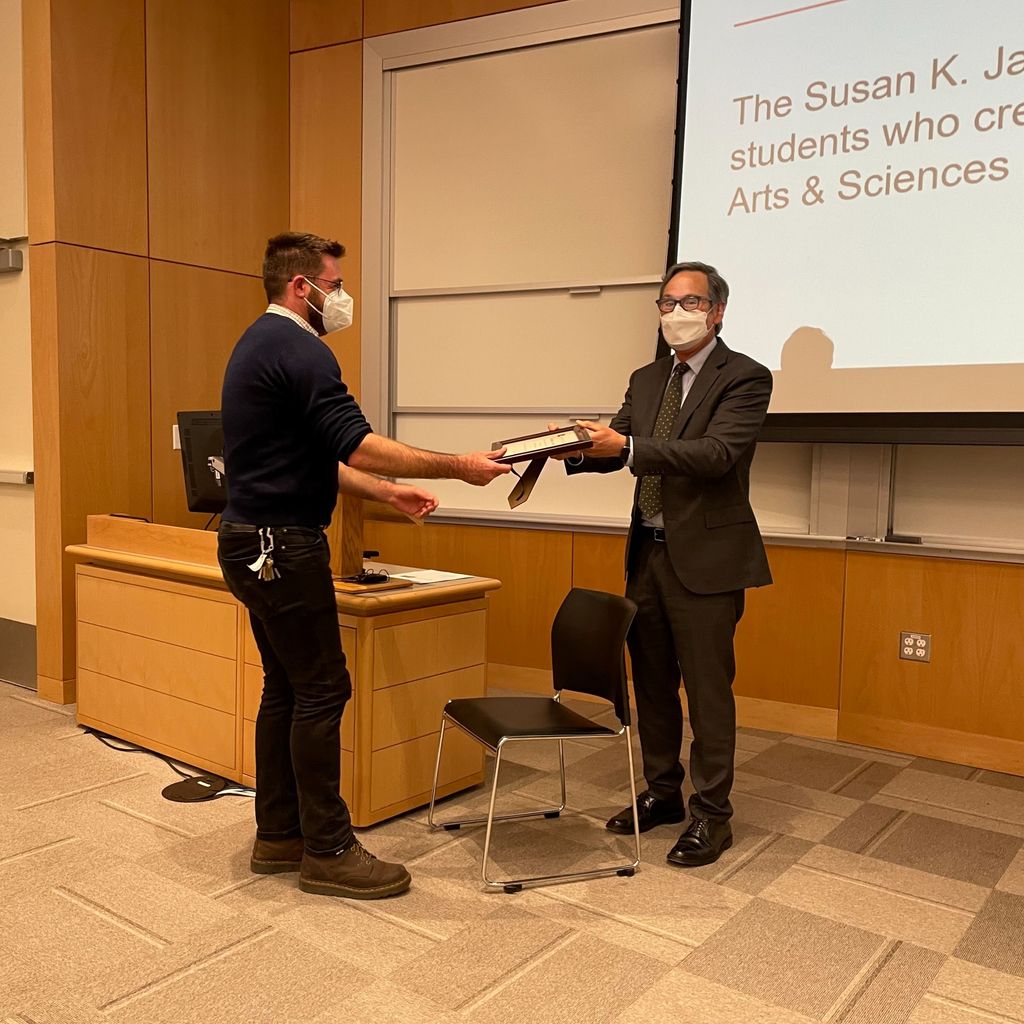
Congratulations to Chris on this well-deserved award!